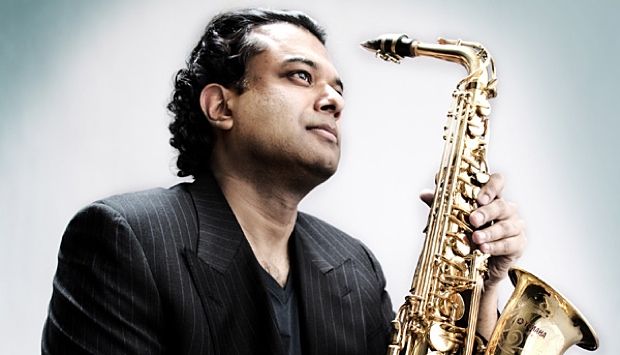Home > Jazz / Blues
06/14/2019
Rudresh Mahathappa's Movable Mirror at Jack London Revue, 6/13/19 / Review
By MICHAEL "SHOEHORN" CONLEY // At one point Rudresh Mahanthappa’s playing reminded me of a surfer riding the crest of a monster wave, staying on top of the surging rhythms by constantly adjusting his balance.
The evening started with the club’s regular Thursday night band- Mel Brown's B3 Organ Quartet, holding forth with compelling Soul Jazz. From impassioned split-tone testifying to a cool Blues stroll with sweet subtones and 8th-note runs, Renato Caranto makes the tenor sax cry, croon, wail and shout. And guitarist Dan Balmer can project even the softest dynamic levels to the back of the room, expertly focusing the audience's attention. I've written more about this group, with drummer Brown and Lewis Pain on organ, in a previous review (of Jason Marsalis) so I will simply reiterate the fact that this band can be enjoyed every Thursday at the Jack London Revue, with an excellent sound mix.
Mahanthappa’s Movable Mirror project features bass player Eric Revis and drummer Dave King. An obvious touchstone of this format- sax, bass, and drums without a chordal instrument- would be the Sonny Rollins trio recordings from the late 50s-60s, but also Ornette Coleman's early bands.
Tonight the players came out of the gate playing some funky rhythms, eventually veering into Charlie Parker's “Barbados”, easily shifting back and forth between a funky feel and a swinging bebop feel. This writer feels Rudresh Mahanthappa has also absorbed plenty of Eddie Harris, with phrases and sequences similar to the tenor icon’s Freedom Jazz Dance.
The next piece featured a vaguely familiar descending progression which, it was revealed later, was actually an arrangement of “Overjoyed” by Stevie Wonder. One could hear people wondering aloud, “what song is that?” The third piece was Charlie Parker's “Red Cross”, and this writer again heard hints of Eddie Harris in the way the saxophone player would run up an arpeggio and drop back to the bottom of the horn to go up another arpeggio, then letting fly impressive volleys of 16th notes in long strings. At one point Mahanthappa’s playing reminded me of a surfer riding the crest of a monster wave, staying on top of the surging rhythms by constantly adjusting his balance.
Mahanthappa indeed has an impressive control of not just his fingers but also of his airflow, getting various timbres from the horn, at times squeezing and flattening the air to produce a nasal tone reminiscent of Eastern reeds. These episodes were woven in and out of his solos before he would tie things back together with a phrase from the opening melody.
A very fresh bass solo opened the next tune, starting off ordinary enough but soon developing into a showcase for extended techniques. With the bow, which at first appeared to be thrust between the strings, Revis produced distorted tones and shapes, scraping and pulling cool and interesting sounds with a frenzied effect, getting different textures and harmonics from the bass. Then, at just the right moment a wailing sax entered with a matching portamento countering the intensity of the bass player’s antics with singing long tones, giving way to wild trills over the hypnotic drone of the strings.
Over this maelstrom the sax solo developed in intensity and the drums came up underneath in sparse currents. Suddenly Mahanthappa was playing the old Harold Arlen song “Get Happy” which elicited laughs from some of us in the crowd, and launched from that back into the Bebop idiom, then segueing into “I Can't Get Started”, stretching the form in places, and somehow from there into the bass line from the old stoner anthem “The Joker” by Steve Miller which became the backing mantra for some for some interesting drum and sax work.
The band closed with Ornette Coleman’s “The Sphinx” and this was perhaps the most cohesive piece the band played, with its discrete sections alternating between a lickety-split opening melodic statement to a slower movement on the bridge. There were a lot of interesting things going on in this piece, including some comping strategies by the saxman, playing one note but using articulation to lend shape and pulse to his accompaniment, then moving the figure up and down in half steps.
Mahanthappa is a Guggenheim fellow and has recorded in various styles including a collaboration with Indian Carnatic sax master Dr. Kadri Gopalnath; a unique Charlie Parker tribute titled “Bird Calls”; and a recent record by his Indo-Pak Coalition, with Rez Abbasi on guitar and Dan Weiss on tabla and drum set. Playing it’s second gig ever, the Movable Mirror trio has not yet recorded. Among his various CDs, LPS and download cards, the artist also was selling socks at his merch table after the gig!








